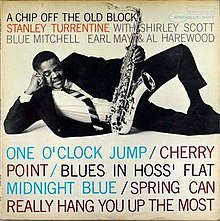
Soul jazz or funky jazz is a subgenre of jazz that incorporates strong influences from hard bop, blues, soul, gospel and rhythm and blues. Soul jazz is often characterized by organ trios featuring the Hammond organ and small combos including saxophone, brass instruments, electric guitar, bass, drums, piano, vocals and electric organ. Its origins were in the 1950s and early 1960s, with its heyday with popular audiences preceding the rise of jazz fusion in the late 1960s and 1970s. Prominent names in fusion ranged from bop pianists including Bobby Timmons and Junior Mance to a wide range of organists, saxophonists, pianists, drummers and electric guitarists including Jack McDuff, Eddie "Lockjaw" Davis, and Grant Green.

Shirley Scott was an American jazz organist. Her music was noted for its mixture of bebop, blues and gospel elements. She was known by the nickname "Queen of the Organ".

True Blue is a jazz album by saxophonist Dexter Gordon and saxophonist Al Cohn, recorded in 1976 for Xanadu Records.
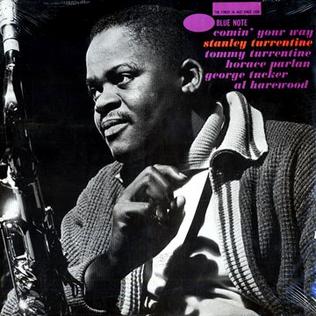
Comin' Your Way is an album by jazz saxophonist Stanley Turrentine recorded for the Blue Note label and performed by Turrentine with his brother Tommy Turrentine, Horace Parlan, George Tucker and Al Harewood. Selections from this album had previously been issued, with additional tracks later appeared as Jubilee Shout!!! (1986), as Jubilee Shouts.
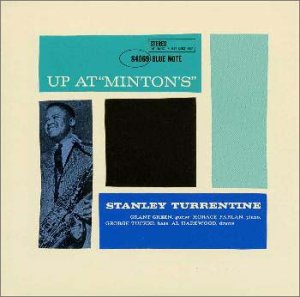
Up at "Minton's", Vols. 1 & 2 are a pair of separate but related live albums by American jazz saxophonist Stanley Turrentine recorded on February 23, 1961 and released on Blue Note later that year. The quintet features rhythm section Grant Green, Horace Parlan, George Tucker, and Al Harewood. The album was later as a double CD set.

Dearly Beloved is an album by jazz saxophonist Stanley Turrentine recorded for the Blue Note label and performed by Turrentine with Shirley Scott and Roy Brooks.

Never Let Me Go is the eighth album by jazz saxophonist Stanley Turrentine recorded for the Blue Note label and performed by Turrentine with Shirley Scott, Major Holley, Ray Barretto and Al Harewood, with Sam Jones and Clarence Johnston replacing Holley, Barretto and Harewood on two tracks.

Hustlin' is an album by jazz saxophonist Stanley Turrentine recorded for the Blue Note label and performed by Turrentine with Shirley Scott, Kenny Burrell, Bob Cranshaw, and Otis Finch.
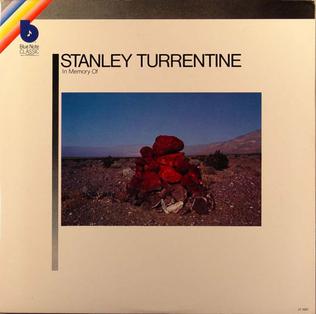
In Memory Of is an album by jazz saxophonist Stanley Turrentine, recorded for the Blue Note label in 1964 but not released until 1979, and performed by Turrentine with Blue Mitchell, Curtis Fuller, Herbie Hancock, Bob Cranshaw, and Otis Finch.

The Spoiler is an album by jazz saxophonist Stanley Turrentine recorded for the Blue Note label in 1966 and performed by Turrentine with Blue Mitchell, James Spaulding, Pepper Adams, McCoy Tyner, Julian Priester, Bob Cranshaw, and Mickey Roker with arrangements by Duke Pearson.

A Bluish Bag is an album by jazz saxophonist Stanley Turrentine consisting of two sessions recorded for the Blue Note label in 1967 and arranged by Duke Pearson, the first featuring Donald Byrd and the second McCoy Tyner, among others.

The Return of the Prodigal Son is an album by jazz saxophonist Stanley Turrentine consisting of two sessions recorded for the Blue Note label in 1967 and arranged by Duke Pearson featuring McCoy Tyner.

Common Touch is an album by jazz saxophonist Stanley Turrentine featuring Shirley Scott recorded for the Blue Note label in 1968 and performed by Turrentine with Shirley Scott, Jimmy Ponder, Bob Cranshaw and Leo Morris. The CD reissue added one bonus track recorded in a different session and originally released on Ain't No Way. The other four tracks may be found on the CD reissue of Easy Walker.
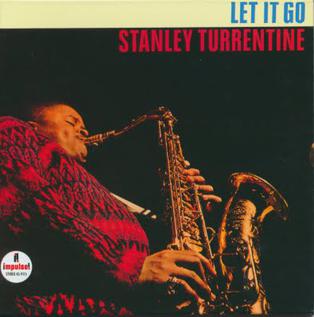
Let It Go is an album by jazz saxophonist Stanley Turrentine recorded for the Impuse! label in 1966 and performed by Turrentine with Shirley Scott, Ron Carter and Mack Simpkins. The CD release added four bonus tracks, three of which originally released on Scott's Everybody Loves a Lover recorded in 1964 and featuring Bob Cranshaw and Otis Finch in place of Carter and Simpkins.
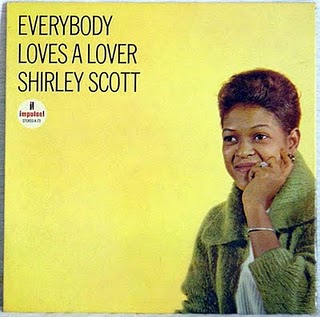
Everybody Loves a Lover is an album by jazz organist Shirley Scott recorded for the Impuse! label in 1964 and performed by Scott with Stanley Turrentine, Bob Cranshaw and Otis Finch. The album has not appeared on CD yet, but the first three tracks were released on the CD reissue of Turrentine's Let it Go.

Soul Shoutin' is a collaboration studio album by organist Shirley Scott recorded in 1963 for Prestige and issued in 1964 as PRLP 7312. It also features her then husband, saxophonist Stanley Turrentine. In 1995, the album was reissued on the same CD along with The Soul Is Willing, featuring a different track order.
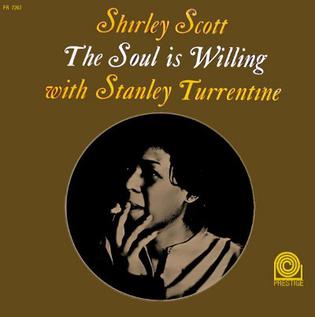
The Soul Is Willing is a studio album by organist Shirley Scott recorded and released in 1963 for Prestige as PRLP 7267. It features famous saxophonist Stanley Turrentine. In 1995, the album was reissued along with Soul Shoutin' on the same CD, featuring a different track order.

Blue Flames is a collaboration album by organist Shirley Scott and saxophonist Stanley Turrentine recorded in 1964 and released on the Prestige label.

Count Basie Presents Eddie Davis Trio + Joe Newman is an album by saxophonist Eddie "Lockjaw" Davis' Trio with Count Basie and Joe Newman recorded in late 1957 and originally released on the Roulette label.
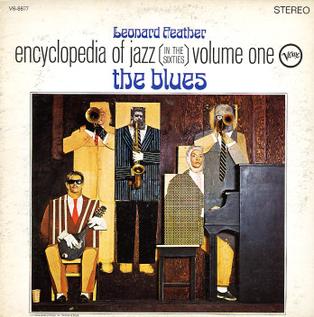
Encyclopedia of Jazz is an album released on the Verve label compiled by jazz journalist Leonard Feather featuring tracks which were recorded to accompany Feather's Encyclopedia of Jazz in the Sixties. The album features three tracks by the Encyclopedia of Jazz All Stars arranged and conducted by Oliver Nelson along with one track each by Jimmy Smith with Wes Montgomery, Count Basie and Johnny Hodges with Earl Hines.
